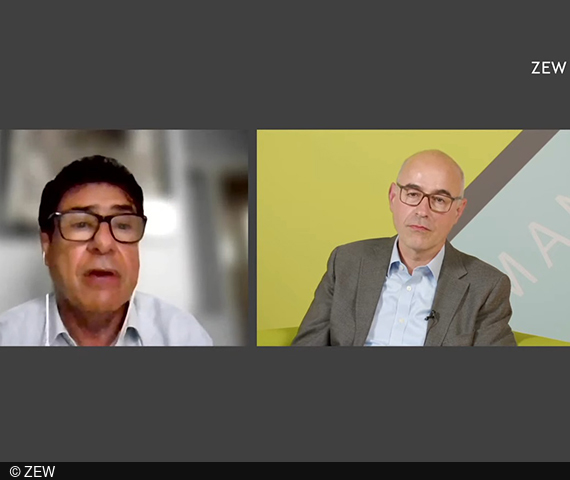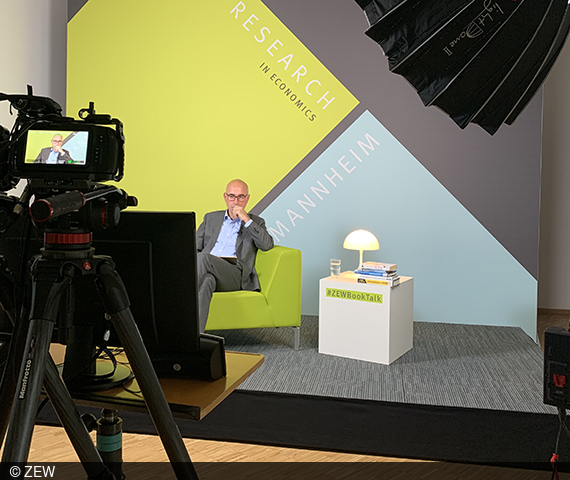“More Competition for More Innovation”
Public Events#ZEWBookTalk on Advancing Innovation
How is creative destruction connected to innovation? Can competition policy stimulate industrial dynamics? How to solve Europe’s ‘unicorn problem’? On 14 September 2021, ZEW President Professor Achim Wambach and Professor Philippe Aghion, Collège de France INSEAD and London School of Economics, have discussed these questions. The French economist also presented his book “The Power of Creative Destruction: Economic Upheaval and the Wealth of Nations” at the seventh #ZEWBookTalk.
“Creative destruction is the process by which new innovations replace old technologies. This idea is based on the Schumpeterian growth paradigm developed by the economist Joseph Schumpeter,” said Philippe Aghion and explained a key element of his book. He described capitalism as a state of disorder. As a result, innovative entrepreneurs create new ideas and bring them to the market. Long-term economic growth was only possible through these processes of innovation, according to the French researcher.
Rethink capitalism
Aghion said the US is an excellent example of how important competition, and in particular good competition policy, is in fostering innovation. The number of new innovations is higher in the USA because innovation benefits from special funding. Nevertheless, the US system also has its downsides, for example the social system, which is clearly inferior to the German system. The COVID-19 pandemic has highlighted the existing problems. Nevertheless, the French economist was sure that one does not have to choose between innovation and a good social system. On the contrary, he said, it was crucial to rethink capitalism in the future and to see innovation and the protection of the entire population as complementary rather than separate. “Denmark’s ‘flexicurity’ model is a great example. It is characterised by high social benefits and various labour market policy measures to activate the work force. It combines flexibility and security,” the economist explained. Studies have proven that such measures have a positive impact on the physical and mental health of workers, which ultimately benefits innovative ideas.
Furthermore, Aghion addressed the impact of digitalisation. He does not support the idea of taxing robots to make the welfare state fit for digitalisation. According to the economist, automation and the increased use of robots could not only boost productivity, lower prices and enhance turnover, but also raise demand, which would promote innovation and create new jobs.
“We need more money for basic research”
In the discussion that followed, ZEW President Achim Wambach raised the question how innovation could be promoted more successfully in practice. In Germany, innovation still primarily takes place within a company, while open innovation remains rare. Both economists agreed that the basic stage of research needs to be open. Once an idea is more mature the private sector can continue the work. Aghion pointed out that the necessary funding is often lacking. “An effective way to nevertheless drive innovation is to establish ministries, or agencies, for that purpose, such as the recently founded Federal Agency for Disruptive Innovation (SPRIND),” the ZEW president remarked.
How to solve Europe’s ‘unicorn problem’?
At the end of the discussion, Aghion and Wambach compared the differences in innovation activity in France and Germany. According to the ZEW president, Germany lags significantly behind France in the number of ‘unicorns’, i.e. companies with a market value of more than one billion dollars. Both economists agreed that the solution must not be for start-ups founded in the EU to go to the US to get the funding they need. “Unfortunately, this is often the case as there are still too many hurdles for investors in the EU. Politicians want to promote innovation in their country but are not willing to accept more competition,” said the ZEW president. This was initially the case in Germany in the debate about companies like AirBnb or Uber. Wambach and Aghion recommend to invest more in innovation instead of preventing competition.


